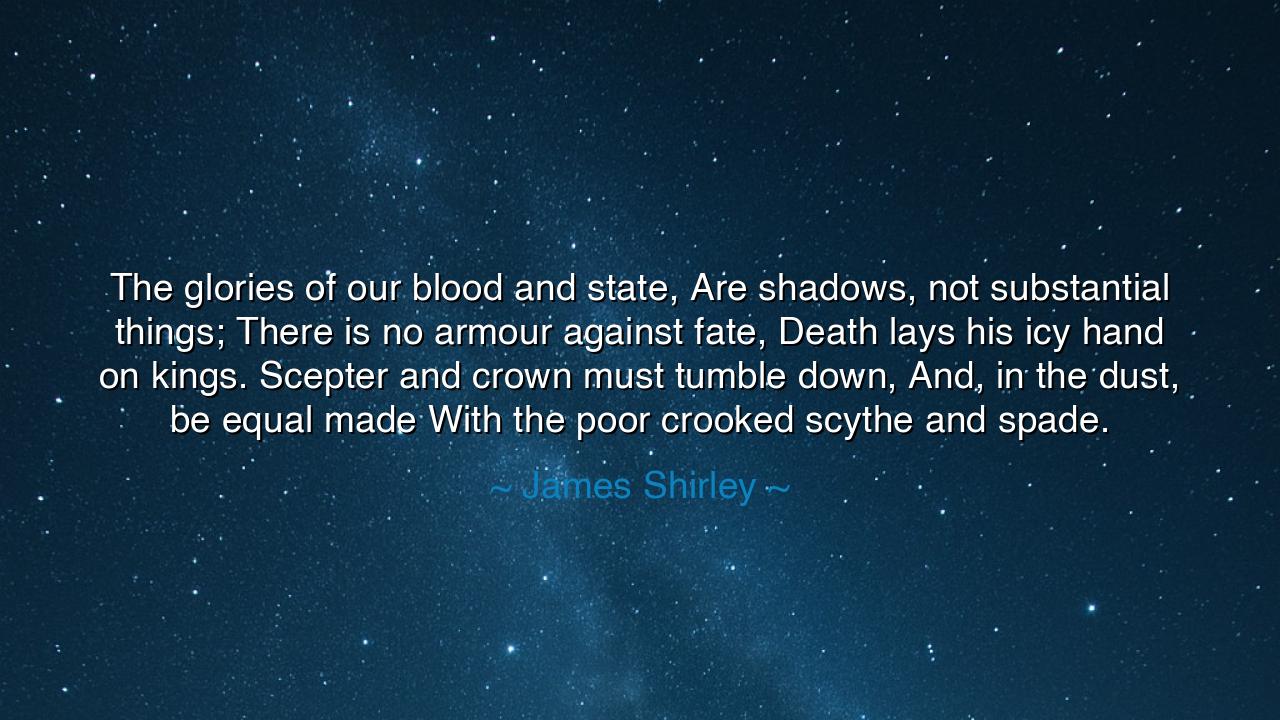
The glories of our blood and state, Are shadows, not substantial
The glories of our blood and state, Are shadows, not substantial things; There is no armour against fate, Death lays his icy hand on kings. Scepter and crown must tumble down, And, in the dust, be equal made With the poor crooked scythe and spade.






“The glories of our blood and state,
Are shadows, not substantial things;
There is no armour against fate,
Death lays his icy hand on kings.
Scepter and crown must tumble down,
And, in the dust, be equal made
With the poor crooked scythe and spade.”
Thus wrote James Shirley, the English poet and dramatist of the seventeenth century, in his solemn work Death the Leveller. In these lines, he unveils one of the deepest and most humbling truths of existence—that all power, wealth, and nobility are but illusions before the great reality of death. No matter how high a man climbs, no matter how adorned his throne or how bright his crown, he will one day lie in the same dust as the poorest laborer. The proud and the humble share the same fate, for death is the great equalizer, the silent hand that spares none and judges all.
The origin of this poem lies in the age of turmoil in which Shirley lived, a time when civil war tore through England, when the mighty fell and the lowly rose, and where the instability of fortune was laid bare before all eyes. Through this, Shirley saw clearly that the glory of man is fragile, like a shadow cast by the sun—it appears grand, yet vanishes with the shifting of light. His poem is both elegy and warning, calling mankind to humility. For if death claims both king and commoner, then pride, arrogance, and greed are but foolish vanities against the eternal truth that all must one day return to the earth.
The line “There is no armour against fate” speaks to the futility of human resistance against the laws of nature and time. Even the mightiest warriors, clad in gold or steel, cannot defend themselves from the final summons. Empires fall, dynasties crumble, and names that once shook the world are swallowed by silence. Consider Alexander the Great, who conquered lands from Greece to India; yet when he died, he ordered that his hands be left outside his coffin—so that all might see he departed empty-handed. In that gesture lay the same truth Shirley expressed: that glory, conquest, and rank fade like mist before the morning sun.
Yet, within this meditation on mortality lies not despair, but liberation. For if death makes all men equal, then it strips away the false barriers that divide humanity. It reminds us that beneath the crown and the rag alike beats the same mortal heart. The dust of kings mingles with that of peasants; the blood of nobles flows red as that of shepherds. Thus, the poet invites us not to mourn, but to live rightly—to measure our worth not by birth or status, but by virtue and deed, which alone endure beyond the grave.
The scythe and spade—symbols of labor and simplicity—stand as emblems of life’s true nobility. While the scepter and crown fall to ruin, the tools of honest toil remain sacred, for they speak of human perseverance, humility, and service. History remembers not only the kings who ruled, but the hands that built, sowed, and healed. When death levels all distinctions, it is character that survives, not title. This is the silent triumph of the meek over the mighty—the immortality of those who live with kindness and integrity.
Indeed, Shirley’s vision echoes the ancient wisdom of Marcus Aurelius, who wrote, “Alexander and his mule-driver are both now dust, alike in death.” It is the same truth that the Buddha taught when he saw a funeral procession and realized that all beings—rich or poor, wise or foolish—must walk that same road. Such understanding frees the soul from envy and pride, teaching that peace lies not in the pursuit of worldly greatness, but in the cultivation of an untroubled heart.
So, O listener, let this poem be a mirror to your soul. Do not cling to titles or treasures, for they will not follow you into the grave. Live not to be remembered as mighty, but to be remembered as good. Treat all men as equals, for death has already done so. And when your own hour comes, meet it not with fear, but with serenity—knowing that you, like all who came before, are but dust returning to dust. For in that humility lies the highest wisdom, and in that acceptance, the soul finds its peace.






AAdministratorAdministrator
Welcome, honored guests. Please leave a comment, we will respond soon